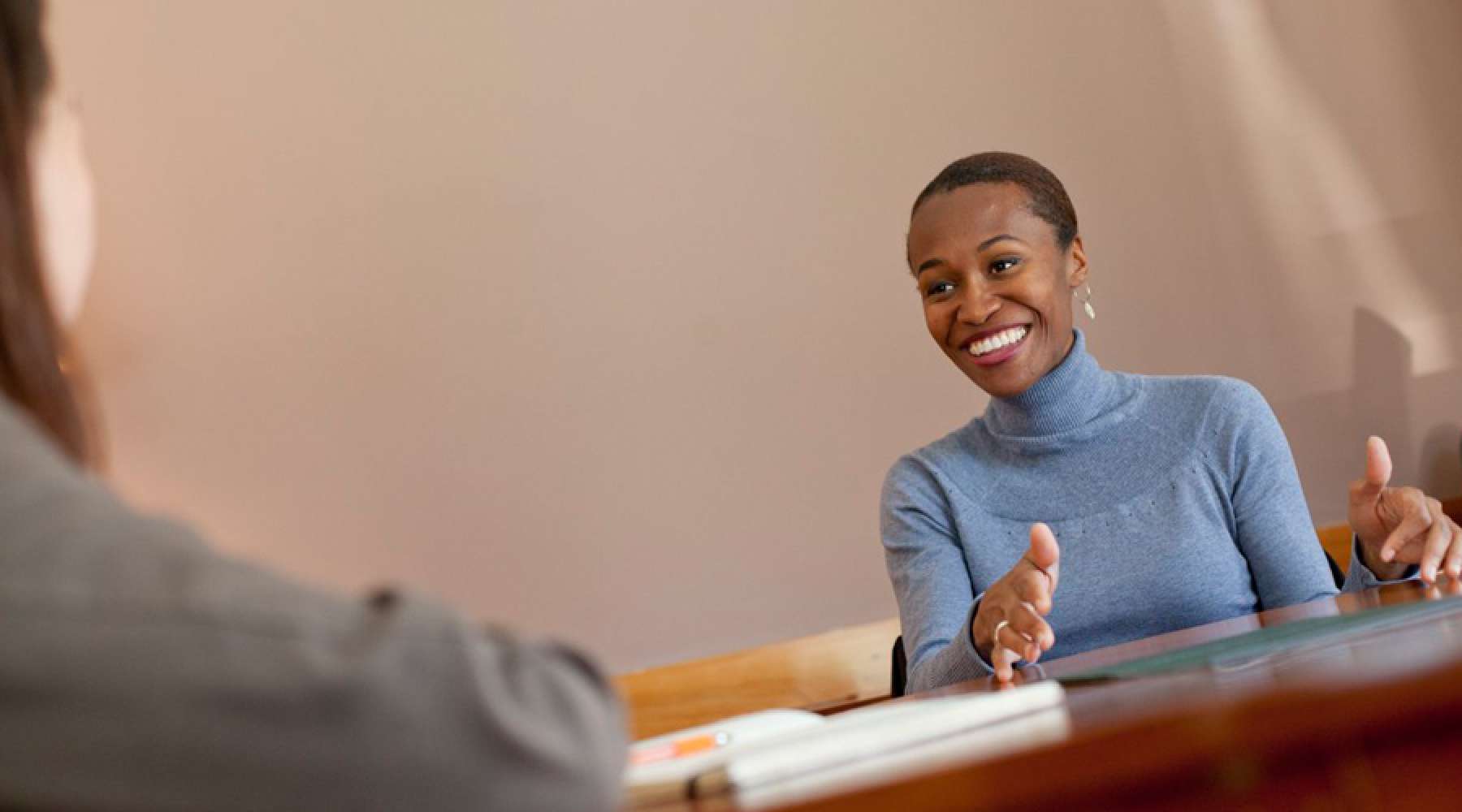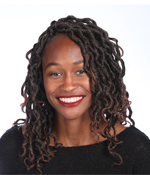
The following post is part of a series of student and alumni perspectives leading into the 26th annual Tuck Diversity Conference, taking place from October 30 through November 1.
I love this year’s DivCo theme “Empowering Every Voice” because it really speaks to what Tuck naturally is and does at its core. It’s something I felt the first time I spoke to a Tuckie, during my first campus visit at Admitted Students Weekend, and in the years that followed—through graduation and beyond.
Like many b-schoolers, I came into Tuck as an accomplished individual (on paper) with a lot of energy and ideas, and ready to take on the world … but often without knowing how or when to speak up, and the best way to say something. From day one, Tuck empowered me to find and grow my voice, taught me to use my voice to empower other voices, and showed me the value of building a different kind of diversity—in my skillset. These learnings at Tuck have proven transformative for me, both personally and professionally.
At Tuck, I learned to speak up in classes (class participation is a significant part of grades for most courses), grow my voice through collaboration and feedback in safe, small-team environments, and further shape it through the Tuckmasters public speaking club.
I became much more comfortable sharing my perspective and influencing, particularly in situations that required tough, candid conversations. This training came into play perfectly in one organization, helping me through a crucial conversation around culture, representation, and impact.
"I became much more comfortable sharing my perspective and influencing, particularly in situations that required tough, candid conversations. … I shared my perspective, highlighted the missed opportunity, and underscored the cultural, economic, and candidly political implications of continuing with the current approach. It illuminated an organizational blind spot, and required some strategic shifting."
A few months into a new role at one organization, I noticed that although our company was strategically focused on deeply engaging with the culture, and signing diverse creators—mostly Black and brown, hip-hop artists—the two diverse employees (me and someone I hired) who were specifically focused on talent acquisition with relevant experience speaking to and working with this talent, weren’t included in the conversation. Since the company was a tech startup—with a typical tech demography and limited BIPOC representation—I assumed the decision was simply an oversight in efforts to build and move quickly. That said, it didn’t take away from the need for transparent, frank conversations with my leadership where I shared my perspective, highlighted the missed opportunity, and underscored the cultural, economic, and candidly political implications of continuing with the current approach. It illuminated an organizational blind spot, and required some strategic shifting.
Once we were able to expand the conversation and move forward with more inclusive outreach, it shifted the conversation around how certain artists and their communities viewed our platform and our work. After seeing and meeting diverse employees, some of the artists and their management teams opened up even more, began to embrace working with us, and encouraged their friends and colleagues to do more business with us. I heard surprise and relief directly from artists and managers, and industry friends and colleagues who these artists worked with. When they realized there were people of color behind the scenes, advocating for them, and helping raise their voices, it changed the game.
During my time at Facebook, I was fortunate to lead a team that helped grow and empower all creators on the platform. As a BIPOC, creators of color have always held a special place in my heart and while working with a small cross-functional group, noted that while these creators were doing great work and creating incredible content that performed well, they were underrepresented in our portfolio of business and their voices weren’t always heard. We wanted to figure out how to broadly address this issue. Since I had a seat at the decision-making table, I worked on changing this, quickly. Initially, there were no dedicated resources for this effort, but I worked with a small, cross-functional team of incredible volunteers and in the spring of 2019, we created and launched the first-ever event specifically for professional Black and Latin X creators on Facebook. Our gathering focused on better understanding black and brown creators’ content experiences, and addressing their challenges with the product, and their representation and voices on the platform. We ate, laughed, talked, and learned from the creators, who shared incredible insights and feedback that we took back, and urged and encouraged leadership to act on. We were thrilled to see that this work not only improved these creators' sentiment, but also paved the way for even more initiatives that raised the voices of other creators of color. Since that event, both Facebook and Instagram have increasingly focused on creating even more meetups and special events for creators of color, and have now begun spotlighting more of them and their content on the platform. Seeing this significant impact inspires me to help change the game in the entrepreneurial and startup world.
One of the things I appreciated and took advantage of at Tuck, was the variety and breadth in the curriculum, which has allowed me to continue to apply diversity to my skills.
I worked in Media and Entertainment pre-Tuck and while I’d planned to go back after graduation, I chose a variety of electives that would stretch me, and allow me to learn something new and interesting, even though I didn’t proactively plan to use these post-Tuck. One of these was an investing class, which was my first look into evaluating and working with the world of startups.
Coming out of this class with just enough confidence and info about investing to be dangerous, I quickly started helping a friend with his startup, and went to work for a Tuckie in my first start-up (eventually acquired by Google), and never looked back. Fast forward a number of years and this experience continues to shape my life in more ways than I initially imagined. I’ve worked as a VP of corporate development and strategy—with an eye towards investing and M&A, continued to advise and help friends’ with their startups, and have become an official Techstars mentor, advising startups across industries and products (e.g. M&E, health care, food & beverage, AI & ML, social good).
This elective experience and knowledge has also been invaluable in my more ‘primary’ career pursuits around Media and Entertainment. As I’ve focused on strategy, business development and general management, I’ve been drawn towards entrepreneurial roles working at standalone start-ups as well as with start-up teams inside of established organizations looking to innovate in their industry.
Ultimately Tuck was my game changer, equipping me with the skills and tools to craft a diverse career and life path.

Fay Wells is a digital media and entertainment executive with experience spanning business and product strategy and growth, marketing, and strategic partnerships for start-ups and market leaders in the US and internationally. She mentors Techstars’ start-ups and has held leadership roles with Facebook, Netflix, Technicolor, The US Tennis Association, and ESPN, where in addition to her business development roles, she was a correspondent for the 2010 FIFA World Cup and the 2011 FIFA Women’s World Cup. Wells has authored work published by the Washington Post, ESPN, IBM, Dartmouth Magazine, along with a case study with Tuck Professor Kevin Keller. She has also guest lectured at Tuck, NYU, and San Diego State University, and spoken about some of this work on NPR, NBC and The Tavis Smiley Show. She holds an MBA from the Tuck School of Business at Dartmouth College, an MEd from the University of Georgia, and an AB from Duke University.